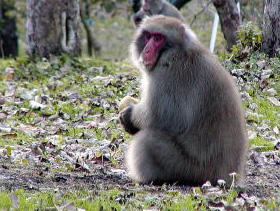Center for International Collaboration and Advanced Studies in Primatology
The International Course in Primatology and Wildlife Research arose with the establishment of the Center for International Collaboration and Advanced Studies in Primatology (CICASP) on April 1st 2009. CICASP was originally situated in the Kyoto University Primate Research Institute, helping it promote international cllaboration in reasearch and education with a focus on the primate mind, body, ecology, conservation, and genome in order to understand the evolutionary origins of human nature. Now, CICASP sits within the Center for the Evolutionary Origins of Human Behavior, after a restructuring of the Primate Research Institute. CICASP administers the International Course in Primatology and Wildlife Research, thereby providing a door for international students to enter Kyoto University.
CICASP welcomed its first students in April 2011, and has since had numerous international students enrolled in its graduate programs, from countries as diverse as the USA, Puerto Rico, Brazil, Chile, Kenya, Bangladesh, India, South Korea, China, England, France, Hungary, Vietnam and Portugal. CICASP faculty assist international students in various ways, such as supervising research projects, providing lectures in comparative animal behavior and teaching the fundamentals of science communication, while CICASP administrators provide all aid necessary to cope with life and academic affairs in a foreign country.
Graduate students of the International Course in Primatology and Wildlife Research fit within the Graduate School of Science, Division of Biological Sciences, and their supervising faculty are now spread between Kyoto University's Center for the Evolutionary Origins of Human Behavior, the Wildlife Research Center, the Center for Ecoogical Research and the Kyoto University Museum.
 Japan is a special country in terms of the study of nonhuman primates. Unlike all other highly industrialized countries or G8 member states, it has an indigenous species of primate, called the Japanese monkey or Snow monkey. The birth of Primatology in Japan dates back to 1948 when Kinji Imanishi (1902–1992) first visited Koshima island with two of his students in order to carry out scientific observations of wild Japanese monkeys. Imanishi endeavored to look for the evolutionary basis of human society by the careful study of monkey societies in their natural habitat. His work was driven in part by the desire of Japanese scientists and laypeople alike to learn the origins of human nature through the study of primates.
Japan is a special country in terms of the study of nonhuman primates. Unlike all other highly industrialized countries or G8 member states, it has an indigenous species of primate, called the Japanese monkey or Snow monkey. The birth of Primatology in Japan dates back to 1948 when Kinji Imanishi (1902–1992) first visited Koshima island with two of his students in order to carry out scientific observations of wild Japanese monkeys. Imanishi endeavored to look for the evolutionary basis of human society by the careful study of monkey societies in their natural habitat. His work was driven in part by the desire of Japanese scientists and laypeople alike to learn the origins of human nature through the study of primates. The Primate Research Institute (PRI) was established in 1967 and for the subsequent six decades promoted basic research synthesizing various approaches to understanding the nature of primates — including humans. The Center for the Evolutionary Origins of Human Behavior was established in April, 2022, following a restructuring of the Primate Research Institute. The center is now home to over 800 non-human primates of 16 species.
The Primate Research Institute (PRI) was established in 1967 and for the subsequent six decades promoted basic research synthesizing various approaches to understanding the nature of primates — including humans. The Center for the Evolutionary Origins of Human Behavior was established in April, 2022, following a restructuring of the Primate Research Institute. The center is now home to over 800 non-human primates of 16 species.